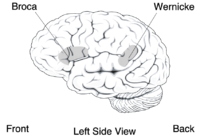
Photo from wikipedia
Research Objectives To preliminarily evaluate a screening tool developed to identify cognitive and communication complaints post-concussion and guide referrals to speech-language pathology (SLP) rehabilitation services. Design Retrospective Chart Review. Setting… Click to show full abstract
Research Objectives To preliminarily evaluate a screening tool developed to identify cognitive and communication complaints post-concussion and guide referrals to speech-language pathology (SLP) rehabilitation services. Design Retrospective Chart Review. Setting Specialty Outpatient Clinic. Participants 129 patients with concussion, mean age 28.02 (SD=15.19), who received care from Shepherd Center's Complex Concussion Clinic (CCC) between August 2019 and March 2020, completed the Cognitive Symptom Screening Tool (CSST) form on the first visit. Interventions Not applicable. Main Outcome Measures Demographics, injury characteristics, medical history, Post Concussion Symptom Scale (PCSS) results, CSST results, and rehabilitation referrals were extracted from the medical charts. A Chi-squared Test was used to examine relationships between patients’ reporting of problems (i.e., cognition, communication, and emotion), demographics, and injury characteristics. Logistic regression analyses were used to explore the SLP referral pattern. Results The most frequently reported cognitive-communication problems were maintaining mental energy throughout the day (81%), staying focused (72%), and completing tasks or assignments (63%). Females reported more difficulties remembering things than males (x2=4.61, p=.03), and females were more likely to be referred to SLP services than males (OR=2.99, 95%CI:1.46-6.25, p=.003). Patients who sustained concussions from motor vehicle accidents (OR=3.01, 95%CI:1.17-9.08, p=.025) or who lost consciousness were also more likely to be referred to SLP services (OR=3.52, 95%CI:1.20-12.89, p=.033). Compared to patients who did not receive imaging services, patients who showed unremarkable imaging signs had a higher chance of receiving SLP rehabilitation (OR=4.15, 95%CI:1.78-10.63, p=.002). Moreover, PCSS scores (OR=1.06, 95%CI:1.04-1.08, p Conclusions Cognitive and communication complaints are frequent post concussion. Sex, severity of injury, and reporting of cognitive and communication issues were related to the referral of SLP rehabilitation services. Author(s) Disclosures We have no conflict of interests to declare.
Journal Title: Archives of Physical Medicine and Rehabilitation
Year Published: 2021
Link to full text (if available)
Share on Social Media: Sign Up to like & get
recommendations!